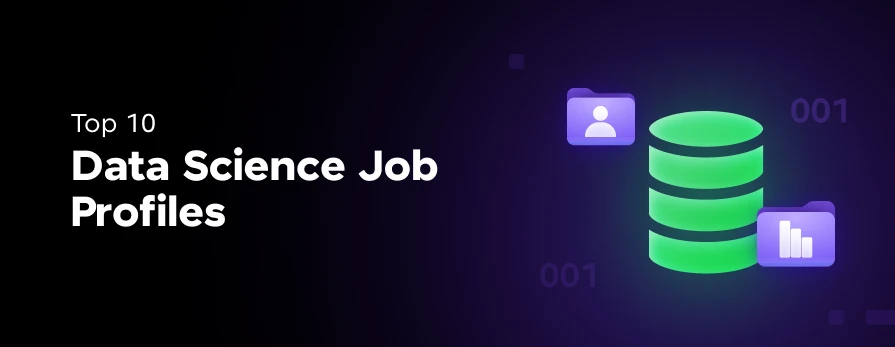
Top 10 Data Science Job Profiles (Careers in Data Science)
Mar 28, 2025 7 Min Read 2494 Views
(Last Updated)
If you are just starting out in data science or someone who already has sound knowledge, the question that arises first is, what should you do after learning data science? What jobs will it offer? What are the careers in data science?
Wonder where to find answers to these questions? Well, you already moved one step closer to finding various careers in data science by clicking this article.
So, without further ado, let us get started and find out some of the high-paying job roles out there!!
Table of contents
- What is Data Science?
- Top 10 Data Science Job Profiles (Careers in Data Science)
- Data Scientist
- Data Analyst
- Data Engineer
- Machine Learning Scientist
- Data Architect
- Database Administrator
- Business Intelligence Developer
- Technology Specialized Roles
- Data Storyteller
- Machine Learning Engineer
- Tips to Land in One of the Careers in Data Science
- Understand the Basics
- Learn Key Tools and Technologies
- Gain Practical Experience
- Specialize in a Niche
- Build a Portfolio
- Network and Connect
- Stay Updated with Industry Trends
- Seek Certifications
- Prepare for Interviews
- Be Adaptable
- Conclusion
- FAQs
- What educational background is required for a career in data science?
- How important is programming in data science?
- How can I transition to a data science career from a non-technical background?
- What are the key differences between a data scientist and a data analyst?
- What soft skills are important for data scientists?
What is Data Science?

This section is a brush-off of your memory that will give you a general idea of what data science is and that will help you understand careers in data science.
In general, Data Science is the art of extracting meaningful insights from vast amounts of data. Think of data science as a way of making sense of a lot of information through data and drawing insights from them.
For example, if you want to know what time of day a store is busiest, you would look at sales data throughout the day, find patterns, and help the store decide the best times to have more staff available.
Data science is all about using data to make better decisions and solve problems, like finding the best time for a store to be fully staffed.
Top 10 Data Science Job Profiles (Careers in Data Science)

As you saw in the previous section, data science is a versatile field that offers various careers in data science each with its own unique responsibilities, skill requirements, and career prospects and you’ll be learning about each of these careers in data science in detail.
But before we go any further, if you want to learn and explore more about Data Science and its functionalities, consider enrolling in a professionally certified online Data Science Course that teaches you everything about data and helps you get started as a data scientist.
Let us have an in-depth look at the top 10 careers in data science to help you understand the opportunities available.
1. Data Scientist
If you are studying data science, the most demanding profession amongst the careers in data science is obviously data scientist.
As a data scientist, you’re at the forefront of data-driven decision-making. You work on analyzing vast amounts of data to uncover patterns, predict trends, and provide actionable insights.
This role often requires a blend of analytical skills, programming expertise, and business acumen.
Key Responsibilities:
- Data Analysis and Interpretation: Analyze large datasets to identify trends and patterns.
- Model Development: Build and refine machine learning models for predictive analytics.
- Communication: Translate complex findings into actionable insights for stakeholders through reports and visualizations.
Skills Needed:
- Proficiency in Python or R
- Knowledge of SQL
- Strong statistical and machine learning skills
- Data visualization tools like Tableau or Power BI.
Career Path:
Data scientists often start with a strong foundation in mathematics, statistics, or computer science. With experience, you can move into senior roles, specializing in areas like AI or big data, or transitioning into leadership positions such as Chief Data Officer (CDO).
Average Salary: ₹8,00,000 – ₹20,00,000 per annum (Subject to change depending on experience, location, and specialization)
We have a complete data scientist roadmap for beginners which explains how to begin your journey to become a data scientist.
2. Data Analyst
Data analysts are the interpreters of data. Your focus will be on cleaning, processing, and analyzing data to support business decisions.
This role is crucial for translating raw data into meaningful insights that can drive strategy and operational improvements.
Key Responsibilities:
- Data Cleaning and Preparation: Prepare data for analysis by removing inaccuracies and formatting it for use.
- Analysis and Reporting: Perform exploratory data analysis and generate reports that summarize key findings.
- Visualization: Create dashboards and charts that visually communicate data insights.
Skills Needed:
- Strong Excel skills
- Proficiency in SQL
- Experience with data visualization tools
- Basic statistical knowledge.
Career Path:
Starting as a junior data analyst, you can advance to roles such as senior data analyst, and data consultant, or even transition into data science or data engineering roles with further training.
Average Salary: ₹4,00,000 – ₹10,00,000 per annum (Subject to change depending on experience, location, and specialization)
3. Data Engineer
One of the high-paying job roles that you can get with the help of data science is data engineer. Data engineers are responsible for building and maintaining the architecture that enables data processing and analysis.
You’ll mainly focus on the infrastructure, including data pipelines and storage systems, ensuring data is accessible and reliable for analysts and scientists.
Key Responsibilities:
- Pipeline Development: Design and implement data pipelines for collecting, processing, and storing data.
- Database Management: Set up and maintain data warehouses and databases.
- Data Quality Assurance: Ensure the integrity and reliability of data through regular monitoring and validation.
Skills Needed:
- Expertise in SQL
- Experience with big data tools like Hadoop or Spark
- Knowledge of programming languages like Python or Java
- Familiarity with cloud platforms such as AWS or Azure.
Career Path:
Data engineers often have backgrounds in computer science or IT. Career advancement can lead to roles such as senior data engineer, data architect, or data platform manager.
Average Salary: ₹6,00,000 – ₹15,00,000 per annum (Subject to change depending on experience, location, and specialization)
4. Machine Learning Scientist
Machine learning scientists research and develop new algorithms and models for machine learning applications.
This role is research-intensive and often involves working on cutting-edge problems in artificial intelligence.
Key Responsibilities:
- Algorithm Development: Develop and refine algorithms for machine learning applications.
- Research and Experimentation: Conduct experiments to test new models and approaches.
- Publication and Collaboration: Publish research findings and collaborate with academic and industry partners.
Skills Needed:
- Strong background in mathematics and statistics
- Proficiency in programming languages like Python
- Knowledge of machine learning frameworks
- Experience in research methodology.
Career Path:
Many machine learning scientists have advanced degrees in computer science or related fields. Career advancement can include roles in research leadership, such as head of AI research or chief AI scientist.
Average Salary: ₹10,00,000 – ₹22,00,000 per annum (Subject to change depending on experience, location, and specialization)
5. Data Architect
One of the most demanding professions in this list is data architect. Data architects design the overall structure of data systems within an organization. you create the frameworks and standards for data storage, integration, and retrieval, ensuring that data systems are scalable and secure.
Key Responsibilities:
- Data Strategy Development: Define the data architecture strategy and roadmap.
- System Design: Design and implement database solutions and data management frameworks.
- Data Governance: Establish policies and procedures for data management, including security and compliance.
Skills Needed: Advanced knowledge of data modeling, SQL, database management systems, and cloud computing. Strong project management and communication skills are also essential.
Career Path: Data architects often progress from roles in data engineering or database administration. you may advance to become Chief Data Officers or take on senior IT leadership positions.
Average Salary: ₹12,00,000 – ₹25,00,000 per annum (Subject to change depending on experience, location, and specialization)
6. Database Administrator
Database Administrators (DBAs) manage the databases within an organization, ensuring data is available, secure, and efficiently managed.
You have to handle everything from database design to troubleshooting and performance optimization.
Key Responsibilities:
- Database Design and Implementation: Create and manage database structures.
- Security and Permissions: Manage access controls and ensure data security.
- Performance Monitoring: Monitor database performance and make necessary adjustments.
Skills Needed:
- Expertise in SQL and database management systems (DBMS)
- Knowledge of data security practices
- Experience with backup and recovery techniques.
Career Path:
DBAs typically have backgrounds in IT or computer science. You can progress to roles like database architect, data engineer, or IT manager.
Average Salary: ₹5,00,000 – ₹12,00,000 per annum (Subject to change depending on experience, location, and specialization)
7. Business Intelligence Developer
BI developers design and implement tools and systems that help businesses analyze data. you work closely with business stakeholders to create dashboards, reports, and other tools that provide actionable insights.
Key Responsibilities:
- Tool Development: Develop and maintain BI tools and dashboards.
- Data Integration: Integrate data from multiple sources to create comprehensive datasets.
- User Training: Train business users on BI tools and best practices.
Skills Needed:
- Proficiency in BI tools like Tableau, Power BI, or Looker
- Strong SQL skills
- An understanding of data warehousing and ETL processes.
Career Path:
BI developers can advance to senior BI roles, data engineering, or data architecture positions. you may also move into data strategy or consulting roles.
Average Salary: ₹6,00,000 – ₹14,00,000 per annum (Subject to change depending on experience, location, and specialization)
8. Technology Specialized Roles
Specialized roles in data science focus on specific technologies or methodologies, such as AI, deep learning, or natural language processing (NLP).
These roles are ideal for you if you have a deep interest in a particular area of data science.
Key Responsibilities:
- Specialized Algorithm Development: Focus on developing algorithms and models in specialized areas like NLP or computer vision.
- Research and Implementation: Conduct research and implement solutions in specific technology domains.
- Collaboration: Work with cross-functional teams to apply specialized knowledge to real-world problems.
Skills Needed:
- Specialized knowledge in AI
- Deep learning
- NLP, or other specific technologies
- Strong programming skills, and a background in mathematics or computer science.
Career Path:
These roles often require advanced degrees and specialized training. Career advancement can include leadership positions in research or technology development, such as head of AI or chief technology officer (CTO).
Average Salary: ₹10,00,000 – ₹25,00,000 per annum (Subject to change depending on experience, location, and specialization)
9. Data Storyteller
Though this job role sounds uncommon and some of you may even find it new, this is a high-paying job role that you shouldn’t miss.
Data storytellers use data to create compelling narratives that help stakeholders understand complex insights. This role involves a mix of data analysis and creative storytelling, making data accessible and engaging.
Key Responsibilities:
- Insight Extraction: Analyze data to uncover key insights and trends.
- Narrative Development: Create compelling stories that explain data insights in a relatable way.
- Visualization Creation: Design visual elements like charts and graphs to enhance the narrative.
Skills Needed:
- Proficiency in data visualization tools
- Strong communication and storytelling skills
- An understanding of data analysis techniques, and a creative mindset.
Career Path:
Data storytellers can come from diverse backgrounds, including marketing, journalism, or data analysis. Career growth may include roles such as data communication strategist or senior data analyst with a focus on reporting and communication.
Average Salary: ₹5,00,000 – ₹12,00,000 per annum (Subject to change depending on experience, location, and specialization)
10. Machine Learning Engineer
Machine learning engineers take models developed by scientists and scale them for production. You focus on the practical application of machine learning in real-world systems, ensuring models are efficient and scalable.
Key Responsibilities:
- Model Deployment: Implement machine learning models in production environments.
- System Optimization: Optimize model performance and scalability.
- Pipeline Maintenance: Build and maintain data and machine learning pipelines.
Skills Needed:
- Proficiency in programming languages like Python
- Knowledge of machine learning frameworks such as TensorFlow or PyTorch
- Experience with cloud computing, and strong software engineering skills.
Career Path:
Machine learning engineers typically have a background in software engineering or data science. Career progression can lead to senior engineering roles or specialized positions in areas like deep learning or natural language processing.
Average Salary: ₹8,00,000 – ₹18,00,000 per annum (Subject to change depending on experience, location, and specialization)
These are the top careers in data science that will help you progress in your data science career and by becoming a part of any one of the job roles mentioned above, you will find yourself to an unopened door of opportunities.
The common thing in almost all the job roles is Python, and if you master Python through a self-paced course, then your future is as secure as a bank vault.
Tips to Land in One of the Careers in Data Science

We provided you with all the top careers in data science and in addition to that, we want to help you out more by providing simple yet efficient tips to land in any one of the careers in data science mentioned above.
Approaching a career in data science involves several key steps, regardless of the specific role you’re aiming for. Here are some general tips to help you get started:
1. Understand the Basics
- Start with a strong foundation in mathematics, statistics, and computer science.
2. Learn Key Tools and Technologies
- Proficiency in languages like Python, R, and SQL is crucial. Each role may prioritize different languages, so focus on the ones most relevant to your desired career path.
- Familiarize yourself with tools and platforms like Excel, Tableau, Power BI, Hadoop, Spark, TensorFlow, and others, depending on your chosen specialty.
3. Gain Practical Experience
- Work on real-world data science projects, either through internships, freelance work, or personal projects. This experience will help you build a portfolio that showcases your skills.
- Participate in data science competitions (e.g., Kaggle) and hackathons to gain practical experience and exposure to new problems.
4. Specialize in a Niche
- As you progress, consider specializing in areas like machine learning, natural language processing, data engineering, or business intelligence. Specialization can make you more attractive to employers and allow you to command higher salaries.
5. Build a Portfolio
- Create a portfolio that includes your projects, visualizations, and any contributions to open-source projects. A well-documented portfolio demonstrates your skills and problem-solving abilities.
6. Network and Connect
- Join professional organizations, attend conferences, and connect with others in the field through platforms like LinkedIn.
7. Stay Updated with Industry Trends
- The field of data science evolves rapidly, so staying updated with the latest tools, techniques, and research is crucial. Follow industry blogs, read research papers, and take advanced courses.
8. Seek Certifications
- Consider obtaining relevant certifications, such as Certified Data Scientist, Microsoft Certified: Azure Data Scientist Associate, or Google Professional Data Engineer. These can validate your skills and enhance your resume.
9. Prepare for Interviews
- Technical Interviews: Prepare for technical interviews by practicing coding problems, understanding data structures and algorithms, and being able to explain your projects and thought processes clearly.
- Behavioral Interviews: Be ready to discuss your experience, challenges you’ve faced, and how you’ve solved problems. Employers often look for candidates who can communicate effectively and work well in teams.
10. Be Adaptable
- Be open to learning new technologies and methodologies. The field of data science is interdisciplinary and often requires adapting to new challenges and tools.
By following these general tips you can definitely land any one of the careers in data science and your career will get a steady hold from that point on.
If you want to learn more about Data Science and its functionalities in the real world, then consider enrolling in GUVI’s Certified Data Science Course which not only gives you theoretical knowledge but also practical knowledge with the help of real-world projects.
Conclusion
In conclusion, the field of study offers numerous careers in data science, each catering to different interests and skill sets.
From data scientists and analysts to machine learning engineers and data architects, these roles provide unique challenges and rewards. By building a solid foundation in relevant technologies, gaining practical experience, and continuously learning, you can find a fulfilling career path in this dynamic field.
Data science is not just a job, it’s a continuous journey of innovation, problem-solving, and making a significant impact across various industries.
FAQs
Typically, a degree in computer science, statistics, mathematics, or a related field is beneficial. Advanced roles may require a master’s or Ph.D.
Very important. Proficiency in programming languages like Python, R, and SQL is crucial for most data science roles.
Start with foundational courses in programming and statistics, then move on to specialized data science training. Practical experience through projects and internships is also important.
Data scientists often focus on building models and algorithms to predict future trends, while data analysts primarily interpret data to provide actionable insights.
Communication, problem-solving, critical thinking, and the ability to work collaboratively are key soft skills.

























Did you enjoy this article?